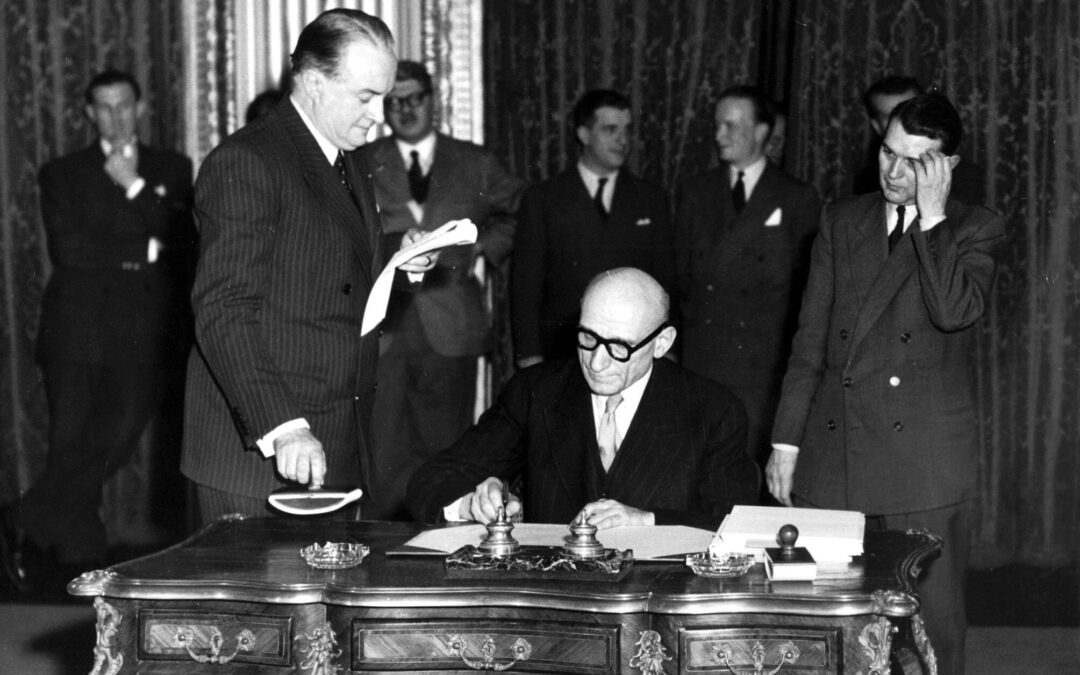Author: Sofia Mazza – Law student Milano-Bicocca University
Communication and marketing manager – Steppo EULaw Editorial board
Date: 20/06/2023
Translator: Sonia M’gayedi
“Europe cannot be made all at once, it will be built all together; it will arise from concrete achievements which above all create a de facto solidarity“.
With these words, on May 9, 1950, Robert Schuman, French foreign minister, outlines this which will go down in history as the Europe of small steps”.
 A reading, still today, of a model of European integration that is variable and sensitive to the characteristics and differences of the various societies, which envisages efforts proportionate to growing and emerging needs over time, intercepted with precise actions.
A reading, still today, of a model of European integration that is variable and sensitive to the characteristics and differences of the various societies, which envisages efforts proportionate to growing and emerging needs over time, intercepted with precise actions.
With that model, over time, the need to protect has arisen, alongside social interests on an ongoing basis evolution, including the financial interests of the European Union, in order to preserve its budget and economic efforts of individual States, for the realisation of the objectives of the treaties.
The reflection contained in the Green Book of the Commission (of the European Communities) of 11 December 2001 is enlightening and emblematic: it shows the intention to establish a European Public Prosecutor’s Office, as a form of enhanced cooperation pursuant to art. 86 of the Treaty on the Functioning of the European Union (TFEU). The realisation of this idea will be definitively implemented with the EU Regulation 2017/1939, which establishes EPPO, acronym of European Public Prosecutor’s Office.
 In just a few years, EPPO, the European Public Prosecutor’s Office, operational since 1 June 2021, thanks to a In a few years, EPPO, the European Public Prosecutor’s Office, operating since 1 June 2021, thanks to a modern, organised and coordinated concept of the Investigative Authorities, has reached important results in the prosecution of crimes affecting the EU’s financial interests, such as fraud, corruption, money laundering, cross-border VAT fraud.
In just a few years, EPPO, the European Public Prosecutor’s Office, operational since 1 June 2021, thanks to a In a few years, EPPO, the European Public Prosecutor’s Office, operating since 1 June 2021, thanks to a modern, organised and coordinated concept of the Investigative Authorities, has reached important results in the prosecution of crimes affecting the EU’s financial interests, such as fraud, corruption, money laundering, cross-border VAT fraud.
In the light of this evidence, there was a wide range of interesting debates on the desirability of extending the powers of EPPO, as well as related prevention and countering instruments, other crimes of a transnational nature, such as terrorist offences or environmental crimes.
Despite this, there is a certain reluctance of the national media in reserving space for the EPPO it deserves: there are only a few mentions relating to his involvement in some investigations, but no particular reflection on this revolutionary step in the process of European integration.
This silence could be attributable to the critical profiles raised by criminal procedural doctrine, concerning above all the institution of the limitation period (with characteristics of considerable diversity in the various Member States), the alternative rites (envisaged in some legal systems and not envisaged in others), as well as the language of documents, the system of notifications or the absence of a single Code of Criminal Procedure.
On closer inspection, issues which, far from being an impediment, could be translated according to the model mentioned above of the “small steps for a complete integration”.
But the appreciations come instead from the various Eppo prosecutors in the member states and also from Roberto Saviano, during the closing conference entitled “Eppo and the Rule of Law”, held at the University of Milan-Bicocca.
 The writer, who has always been committed to combating financial crimes, underlines the potential of the European Public Prosecutor’s Office as an instrument for transnational combating of financial crimes, as well as a “coordination unit” of financial information between the various countries and above all between the Investigative Authorities, first among all the Guardia di Finanza and the Customs Agency.
The writer, who has always been committed to combating financial crimes, underlines the potential of the European Public Prosecutor’s Office as an instrument for transnational combating of financial crimes, as well as a “coordination unit” of financial information between the various countries and above all between the Investigative Authorities, first among all the Guardia di Finanza and the Customs Agency.
Roberto Saviano recalls a heinous crime which took place in the Ponticelli district (Naples) in the 1980s, to the detriment of two little girls. The Camorra hands over three innocent people, real scapegoats and the Italian judiciary is forced to give in to this compromise, the recipient of incessant pressure from the press and public opinion, justicialist and eager for a response as strong as it is fast, in punitive terms, by the state.
The existence of a European Public Prosecutor’s Office would have been decisive, inasmuch as it is endowed with an objective gaze, not subject to undue expectations, the classic friend, to whom we would all turn for an objective solution to the problem, as a “third party and impartial”, not casually essential connotations of the criminal judge, as provided for by art. 111, II co. of our constitutional charter, as well as by art. 6 of the European Convention on Human Rights.
In conclusion, the need for further developments of this form of European cooperation in criminal matters undoubtedly emerges and we, with the Steppo Eulaw project of the University of Milan-Bicocca, in compliance with the modus operandi of the founding fathers, are trying to do “our small step”, in this long journey. And our project goes on: we are proud to announce the presence of the new Committee media, led by none other than Roberto Saviano.

